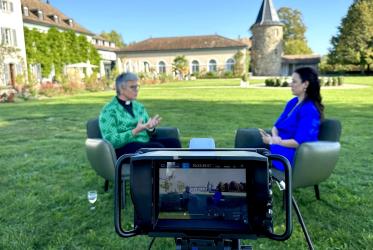Presentation by Metropolitan Prof. Dr Gennadios of Sassima
Without any doubt ecclesiology, in our times, still remains the crucial issue for Christian theology in ecumenical perspective.1 In the growing number of interchurch theological dialogues, a consequence of the ecumenical movement, this special topic of theology becomes more and more the focus of interest in modern theological research. At the same time, it becomes evident that the vast spectrum of ecclesiology in theological study assumes a concrete shape and a specific expression. As a response to the challenge to intensify interchurch relations or to make theology more explicitly relevant and concrete for the modern world, ecclesiology today becomes the meeting point for church-centered ecumenism and church centered theology.
Thus it is not astonishing that such rich theological production has been manifest in this area of ecumenical theology during the past decades. One cannot fail to appreciate the intense ecclesiological research work based on sound biblical premises and historical-patristic studies. Ecclesiology has therefore contributed not only to a better understanding between divided Christian Churches and confessional denominations, but also towards a more complete self-understanding on the part of each confession; and indeed, it has given a new impetus for the renewal of Christian theology itself.2
The new question is how to evaluate this extremely rich ecumenical heritage of the past and use it in an appropriate comprehensive and synthetic way, not so much for producing further statements of confessional ecclesiological positions-this only risks repeating positions which are already well-known - but rather to reflect on an ecclesiological renewal both in ecumenism and in theological work. It seems to me that our task at this moment is to use this enormous ecclesiological literature and attempt to find a new type of ecclesiological approach, with the intention of promoting an ecclesiology of more convergence, giving more ecclesiological space for discussion, study and mutual enrichment between our one-sided ecclesiological positions. It is precisely this kind of ecclesiological approach, which is behind or rather at the basis of such pre-consensus documents as the Porto Alegre Assembly Statement on Ecclesiology “Called to be the One Church.”The Statement indicates precisely where we are today on the ecumenical scene in the quest for the unity of the Church: “..the relationship among churches is dynamically interactive. Each church is called to mutual giving and receiving gifts and to mutual accountability. Each church must become aware of all that is provisional in its life and have the courage to acknowledge this to other churches. Even today, when Eucharistic sharing is not always possible, divided churches express mutual accountability and aspects of catholicity when they pray for one another, share resources, assist one another in times of need, make decisions together, work together for justice, reconciliation, and peace, hold one another accountable to the discipleship inherent in baptism, and maintain dialogue in the face of differences, refusing to say "I have no need of you" (1 Cor12:21). Apart from one another we are impoverished.” 3
The Christian world’s quest for unity is one with its quest for the Church. All who have been challenged by the important topic of ecclesiology, emerging also from the bilateral and multilateral theological dialogues of the Christian Church, which work for this reality must therefore ask themselves what kind of unity this is to be or, in other words, what nature the Church has so that it might correspond to God’s will and plans for our salvation. Of course, there are conflicting assessments concerning the nature of the Church’s unity, the role of the Church and its ecclesiastical and ecclesiological inner structure and tradition.
However, there are some common features that are particular to the theology emanating from the One, Holy, Catholic and Apostolic Church – a common historic framework, sometimes a continuity in tradition, an overall influence of Greek-Roman philosophy – particularly in Europe – sometimes a similarity in worship and a common consciousness in preserving, nurturing and developing the theological tradition of the Church.
Therefore, debates on unity become the focus of ecclesiological discussions in the ecumenical arena today. But diversity on the ecclesiological foundations of unity today remains the main obstacle for doctrinal agreement between the various Churches.
1 Cf. Ioannis Karmiris, Orthodox Ecclesiology, V and VI, Athens 1973, 7 (in Greek). See also O. Dibelius, Das Jahrhundert der Kirche, Berlin, 1927; J.R. Nelson and K.D. Schmidt, in : T. Rendtorff, Kirche und Theologie, Gütersloh, 1966, p.11; W.A. Visser’t Hooft, Teachers and the Teaching Authorities, WCC Publications, Geneva, pp. 35-40.
2 Cf. Nikos A. Nissiotis, The Church as a sacramental vision and the challenge of Christian witness, in Gennadios Limouris, (ed.), Church, Kingdom, World: The Church as Mystery and Prophetic Sign, Geneva: WCC, 1986.
3 Para 7#.



